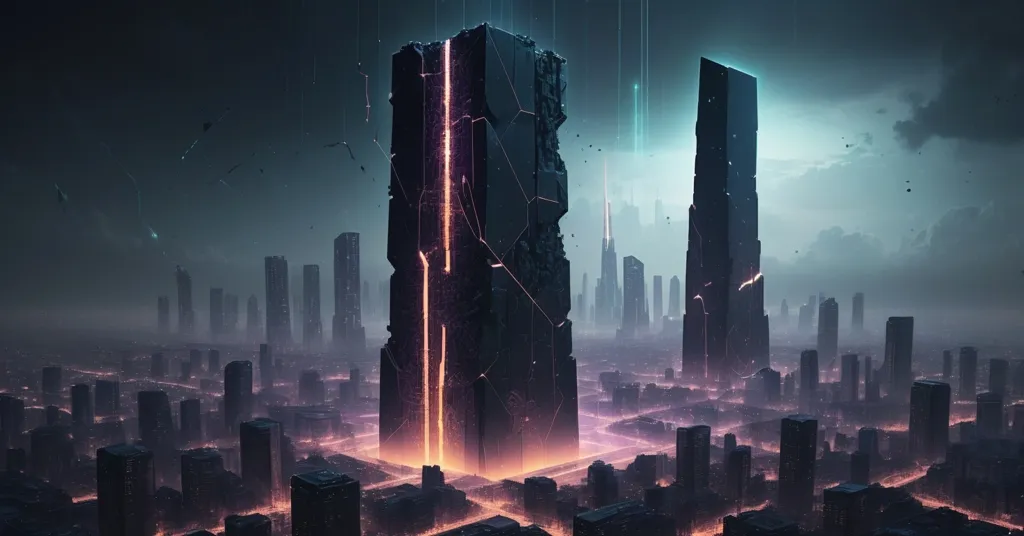OpenAI’s $500B Rise: A Threat to Crypto’s Decentralized Future?

OpenAI’s $500 Billion Ascent: A Tech Titan Threatening Decentralization’s Core?
OpenAI has blasted from a humble startup to a $500 billion private behemoth in under three years, rewriting the rules of Silicon Valley with ruthless speed and bottomless pockets. Led by Sam Altman, this AI giant is pushing boundaries with tools like ChatGPT, but is its unchecked dominance a boon for innovation or a death knell for the decentralized ideals we hold dear in the crypto space?
- Valuation Explosion: OpenAI reaches a $500 billion valuation, towering over Silicon Valley.
- Massive Reach: ChatGPT serves 800 million weekly users, while new tools like Sora explode in popularity.
- Market Fallout: Aggressive growth crushes smaller startups and raises red flags for centralization.
The AI Titan’s Arsenal: Powerhouse Products and Partnerships
Let’s strip away the hype and get down to brass tacks. OpenAI started with a noble mission to advance AI for humanity’s benefit, but today it’s a juggernaut steamrolling competition. Their flagship product, ChatGPT, isn’t just a chatbot—it’s a global phenomenon with 800 million weekly users. For those new to AI, ChatGPT is a generative model trained on massive datasets to mimic human conversation, answer queries, and even churn out code. Think of it as a super-smart assistant, powered by complex algorithms and raw computing muscle, not unlike how blockchain nodes crunch data to validate transactions. Its success has catapulted OpenAI into new arenas, like the Sora video app, which notched a million downloads in just five days. Sora 2, now accessible via API for developers, and Codex, a fully launched software engineering agent to speed up coding, show OpenAI’s relentless drive to dominate every corner of AI.
At their DevDay event in San Francisco, attended by 1,500 developers, Sam Altman rolled out updates and partnerships that scream ambition. A key alliance with Nvidia, the world’s most valuable company, focuses on building data centers—sprawling facilities packed with servers that train and run AI models. This isn’t just a tech handshake; it’s a power play to lock down the infrastructure AI needs to thrive. Then there’s the eye-popping $6.4 billion talent deal snagging Jony Ive, the ex-Apple designer who shaped the iPhone, to craft AI hardware. Ive’s vision sounds almost utopian, but it’s hard to ignore the potential.
“My goal was to create tools that make us happy and fulfilled and more peaceful and less anxious and less disconnected,” Ive declared, sketching his hopes for AI hardware at OpenAI.
Silicon Valley’s Casualties: Startups Crushed Underfoot
While OpenAI builds empires with tech titans, the little guys are getting obliterated. Smaller startups are scrambling to survive on whatever crumbs OpenAI leaves behind, forced into narrow niches to dodge its shadow. Venture capital is flooding AI at a staggering clip—$83.9 billion in growth-stage funding in the first half of 2025, with forecasts to top 2021’s record of $96.1 billion. VCs are tossing cash at AI like it’s the last meme coin pump, but much of it flows to giants like OpenAI or rivals like Anthropic, which just raised $13 billion at a $183 billion valuation. Investors are hunting for unexplored opportunities, or “white space,” where OpenAI hasn’t yet staked a claim. Index Ventures, for example, led a $25 million round for Quilter, a startup using AI to design printed circuit boards, founded by ex-SpaceX engineer Sergiy Nesterenko. Meanwhile, Exa Labs, started in 2021, pulled in $85 million at a $700 million valuation with Nvidia’s backing. These moves hint that some still see room to snag a slice of the AI pie.
“The pie is really big, and OpenAI is just one company,” said Jeff Wang, co-founder of Exa Labs, offering a sliver of hope for underdogs.
But let’s not kid ourselves. The lack of public oversight for private monsters like OpenAI is a glaring problem. Unlike public companies forced to disclose financials and face shareholder scrutiny, private giants operate in the dark. This fuels unchecked spending and vertical integration—where a company controls every step of its product pipeline, from hardware to software, often choking out competitors. Nina Achadjian of Index Ventures didn’t mince words on the risks this poses.
“There’s no reckoning, because none of the companies are public. That further fosters the exuberance of capital raising, capital spending, and vertical integration,” Achadjian cautioned.
She’s dead right. This gold rush vibe, powered by private funding with zero transparency, reeks of the dot-com bubble in the early 2000s, where blind hype led to epic meltdowns. And here’s the kicker: AI’s tech edge isn’t even that unique. OpenAI’s own COO, Brad Lightcap, laid it bare.
“There are no technical moats anymore,” Lightcap admitted, signaling that momentum and cash, not proprietary tech, drive the AI race.
For clarity, a technical moat is a unique advantage competitors can’t easily copy—like Google’s early search algorithms. Without it, AI competition becomes a brutal, cash-burning sprint where only the fattest wallets win. Even heavyweights like Google and Meta are lagging behind OpenAI and Anthropic in this game. Meanwhile, government nods, like the White House approving OpenAI’s data center projects, show AI’s strategic weight on a national scale. For more on their meteoric rise, check out this detailed report on OpenAI’s $500 billion valuation and secretive strategies.
Centralization vs. Decentralization: A Crypto Wake-Up Call
Now, let’s pivot to why this matters to us in the crypto sphere. OpenAI’s grip on AI mirrors the old banking cartels Bitcoin was born to disrupt—centralized power, just with fancier algorithms. Both AI and blockchain are transformative forces challenging entrenched systems, whether it’s Big Tech or traditional finance. OpenAI’s breakneck pace echoes Bitcoin’s early days, when adoption outran regulation and comprehension. But here’s the rub: Bitcoin thrives on decentralization, a network with no single point of control, while OpenAI’s dominance hints at a new tech overlord. Ethan Kurzweil of Chemistry Ventures nailed the chaotic energy of this era.
“It’s the fastest-moving time in startup creation and disruption in my 17 years of investing,” Kurzweil observed.
From a Bitcoin maximalist lens, I’ll say this: Bitcoin’s decentralized purity stands untouched by AI’s centralized mess. It might be the one safe harbor if this bubble pops. Yet, as advocates of effective accelerationism, we can’t ignore that OpenAI’s speed is shoving tech forward—a net positive if it weren’t so damn exclusionary. Their growth aligns with pushing boundaries fast, but at the cost of equitable access, something crypto fundamentally aims to fix.
Could AI and blockchain team up to disrupt the status quo further? Hell yes. Imagine AI optimizing yield farming strategies on Ethereum or powering smarter DeFi protocols. AI could supercharge on-chain analytics or even crank out NFTs with next-level creativity. But if giants like OpenAI hoard the best tech, locking it behind closed doors, we’re just trading one walled garden for another. We need open protocols to keep the balance of power in check.
Future Implications: AI Hype, Crypto Lessons, and Looming Risks
The speculative frenzy around AI funding feels eerily familiar to the 2017 ICO craze in crypto, when billions poured into half-baked token projects with no substance. Many flopped, eroding trust, but survivors like Ethereum thrived by sticking to decentralization. Can AI follow a similar path, or will centralized players like OpenAI keep sucking up the oxygen? History suggests unchecked giants don’t play nice forever. The dot-com crash taught us that hype without fundamentals leads to pain. Today’s AI bubble, with its lack of technical moats, risks commoditizing tools—think trading bots or wallet security apps for crypto becoming dirt-cheap and controlled by the biggest fish.
On the flip side, let’s give credit where it’s due. OpenAI’s dominance could accelerate tech that later gets decentralized. Their innovations might lay the groundwork for open-source AI tools that blockchain devs can harness without bending the knee. Think of it as the early internet—proprietary at first, but eventually cracked open by communities. Government involvement adds another layer. The White House backing OpenAI’s data centers signals AI’s national importance, much like how crypto faces regulatory heat for its economic impact. Are we barreling toward a future where both AI and blockchain get smothered by overzealous oversight? That’s a question worth chewing on.
Zooming out, smaller AI startups intersecting with crypto—like potential tools for blockchain security or decentralized AI networks—are thin on the ground. Why? OpenAI’s shadow looms large, and VCs might be too spooked to bet on long shots. This gap matters. If we can’t foster innovation at the crossroads of AI and blockchain, we risk losing the decentralized edge that defines our fight against centralized power.
Key Questions and Takeaways
- How does OpenAI’s dominance clash with decentralization in crypto?
OpenAI’s centralized control and secretive growth mirror the very systems Bitcoin rejects, risking a new tech monopoly that could stifle open, decentralized ecosystems we champion. - Can blockchain developers leverage AI without OpenAI’s chokehold?
Yes, by pushing for open-source AI tools and protocols integrated with blockchain, devs can harness AI for DeFi or analytics while dodging reliance on centralized giants. - What parallels exist between AI’s funding bubble and crypto’s ICO era?
Both are fueled by speculative capital with little oversight, echoing the 2017 ICO madness—AI’s hype could crash similarly if unchecked, denting trust in emerging tech. - Why does the lack of technical moats in AI matter for crypto innovation?
Without unique barriers, AI tools for crypto—like trading bots or security—could become cheap commodities dominated by big players, sidelining smaller innovators and centralizing power. - Could OpenAI’s rapid pace align with effective accelerationism in tech?
Absolutely, their speed drives progress we applaud, but only if it doesn’t cement centralized control—blockchain must ensure access remains open to truly accelerate disruption.
OpenAI’s $500 billion valuation and relentless expansion are a rocket launch with shaky landing gear. They’re shattering ceilings in AI, from consumer apps to hardware, with partnerships and talent grabs rivaling tech’s biggest legends. But their secretive spending and suffocating dominance threaten to bury Silicon Valley’s startup spirit and, by extension, the decentralized future we’re building in crypto. As champions of freedom, privacy, and disrupting stale systems, we salute the innovation but stand wary of centralized power grabs. The AI boom, like the crypto revolution, brims with potential—only if it avoids rebuilding the same old fortresses we’re hell-bent on tearing down. Keep your eyes peeled; giants like this don’t stay benevolent for long.



